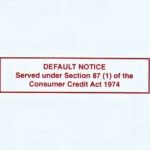County Court Judgement
A County Court Judgment, or CCJ, is a legal ruling made by a county court in the United Kingdom that determines whether an individual or business owes a debt to another party. This judgement is typically issued when a creditor has attempted to collect payment from a debtor and has been unsuccessful. The CCJ can have serious consequences for the debtor, such as damaging their credit score and potentially leading to enforcement action, including bailiffs seizing assets or funds being taken directly from their bank account. It is important for individuals and businesses to be aware of their legal obligations and to take action to avoid a CCJ being issued against them.
How Will a CCJ Affect My Credit Rating
A CCJ can have a significant impact on an individual’s credit rating in the United Kingdom. Once a CCJ has been issued against an individual, it will be recorded on their credit file and will remain there for six years, even if the debt is paid off. This can make it more difficult for the individual to obtain credit, as lenders may view them as a higher risk. In addition, the CCJ will be visible to anyone who carries out a credit check on the individual, including potential employers or landlords. However, if the individual pays off the debt within one month of the CCJ being issued, they can apply to have the judgement removed from their credit file. It is therefore important for individuals to take action as soon as they receive a CCJ in order to minimise the impact on their credit rating.
Options for Responding to a CCJ
| Court Form | When to use it |
|---|---|
| N9A | If you respond to the claim within 14 days of receiving it |
| N245 | If you miss the deadline to respond to the claim |
When an individual receives a County Court Judgment, or CCJ, in the United Kingdom, they have several options for responding to it. Firstly, they may choose to pay the debt in full, either immediately or within one month of the CCJ being issued, in order to avoid the judgment being recorded on their credit file. Alternatively, they may wish to negotiate a payment plan with the creditor, allowing them to pay off the debt in instalments over a longer period of time using Court Form N9a usually part of the response pack when you receive your CCJ.. In some cases, it may be possible to apply to have the CCJ set aside, either because the individual disputes the debt or because they were not aware of the claim against them. However, this is a complex process and will require evidence to support the application. Finally, the individual may choose to do nothing, in which case the CCJ will remain on their credit file for six years and the creditor may take enforcement action against them to recover the debt. It is important for individuals to consider their options carefully and seek legal advice if necessary, in order to ensure the best possible outcome in their particular circumstances.
Court Form N245 (download) can be used by an individual in the United Kingdom when responding to a County Court Judgment (CCJ). This form is also known as the “Application for a Variation or Set Aside of an Enforcement Order” and is used to apply for a change in the payment terms of the CCJ. For example, an individual may use this form to request a reduction in the monthly payments required or to ask for an extension of the payment period. It is important to note that the use of Form N245 does not automatically result in the CCJ being set aside or varied, and the court will consider each application on its individual merits. It is therefore advisable for individuals to seek legal advice before making an application using Form N245, in order to increase their chances of success.
Here is an example where the debtor was not able to pay the full amount of £2,132.94, but using Court Form N245, they were able to get monthly payments down to just £1.00 per month!
Consequences of Ignoring a CCJ
Ignoring a County Court Judgment (CCJ) in the United Kingdom can have serious consequences for an individual. If the individual fails to respond to the CCJ or make payment as required, the creditor may take enforcement action against them to recover the debt. This could include instructing bailiffs to seize assets, obtaining a charging order against the individual’s property, or applying for an attachment of earnings order, which would require the individual’s employer to deduct payments directly from their wages. In addition, the CCJ will remain on the individual’s credit file for six years, which could make it more difficult for them to obtain credit or other financial products in the future. It is therefore important for individuals to take action as soon as they receive a CCJ and seek legal advice if necessary, in order to avoid the potential consequences of ignoring the judgement.
Search Johnny Debt for more information on County Court Judgements or CCJ.
#johnnydebt
| |
How to Get Out of Debt is an eight-stage strategy that enables readers to pay off debt and fix their finances for good. This book has it all covered. | |
| |
How to Live for Free - I have done a full review on the book here: How to Live for Free | |
| |
The Money Diet - revised and updated: The ultimate guide to shedding pounds off your bills and saving money on everything! | |
 |
Pay Off Your Debt Book: Your Ultimate Financial Planner and Budget Companion for Managing Money Discover the Essential Debt Management and Budgeting Tool for Financial Success | |



